The best AI agents in 2025: A guide to the top tools

Stevia Putri
Last edited December 30, 2025
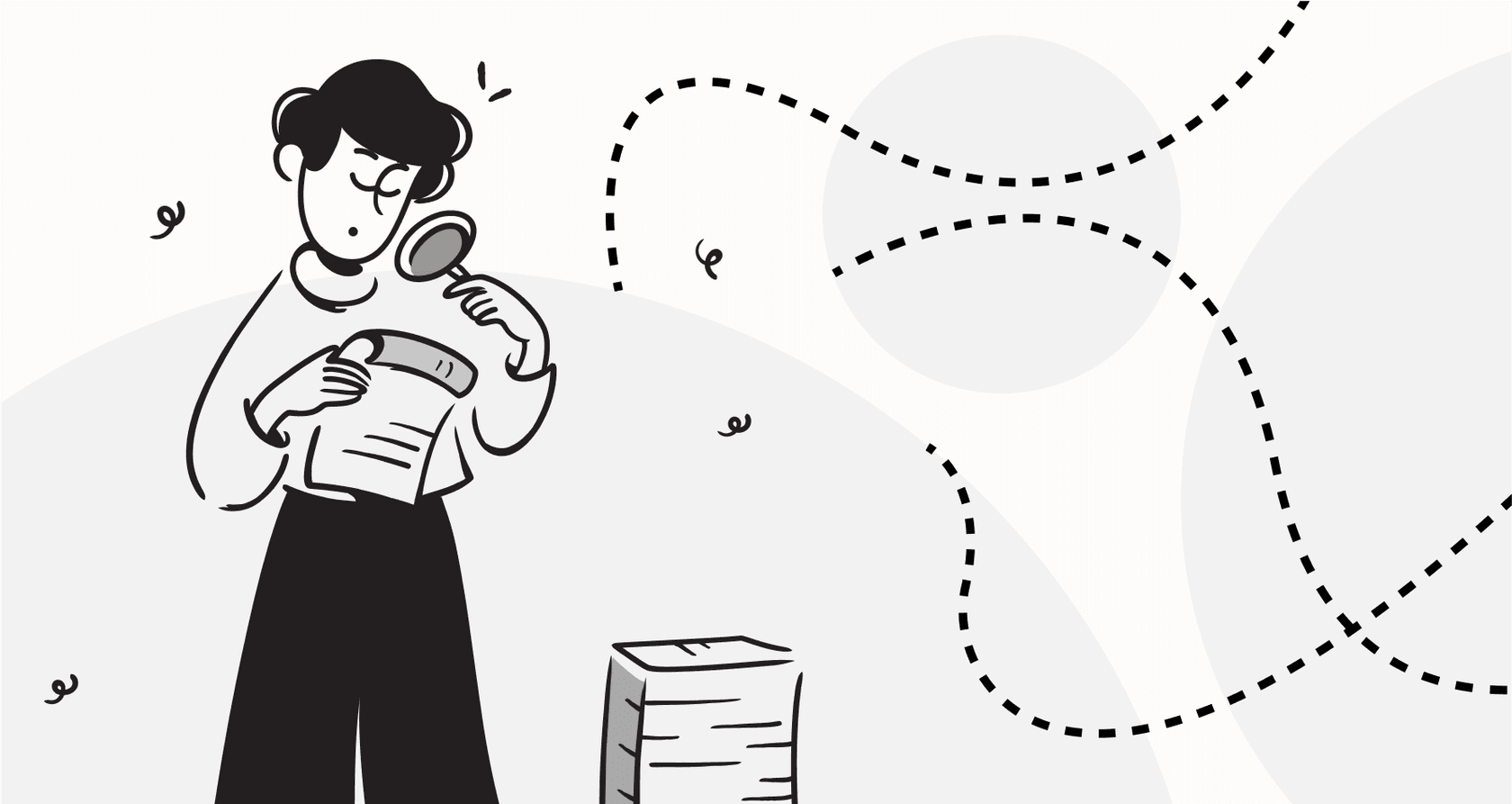
Let’s be honest, repetitive tasks are a drain. The small, manual jobs piling up for support, IT, and operations teams eat up valuable time and stop people from focusing on work that actually moves the needle. We’ve all seen it: triaging tickets, answering the same questions for the hundredth time, and manually updating records. It's tough on both innovation and morale.
This is where AI agents come in. They’ve grown from simple chatbots into autonomous systems that can think, plan, and act for your business. These aren't just glorified FAQ bots; they're digital colleagues that can execute real tasks inside your company’s apps.
In this guide, we'll walk you through the best AI agents for businesses in 2025. We’ll compare the tools, their best uses, and what they cost, so you can make a clear choice without all the hype.
What are the best AI agents?
At its core, an AI agent is a program that can understand its digital surroundings, make smart decisions, and carry out tasks on its own to reach a goal. Think of it as a system that doesn't just talk, it does.
Unlike chatbots that follow a strict, pre-written script, AI agents are all about achieving an outcome. They can pull information from different places, figure out the best next step, and complete workflows that have multiple parts. This works because of a few key pieces:
- Perception: The agent connects to your business tools (like your help desk, knowledge base, or CRM) to get the full picture.
- Reasoning: It uses Large Language Models (LLMs) along with your company's own rules and logic to decide what to do.
- Action: It uses APIs to get things done, like updating a ticket in Zendesk, checking an order in Shopify, or routing an issue in Slack.
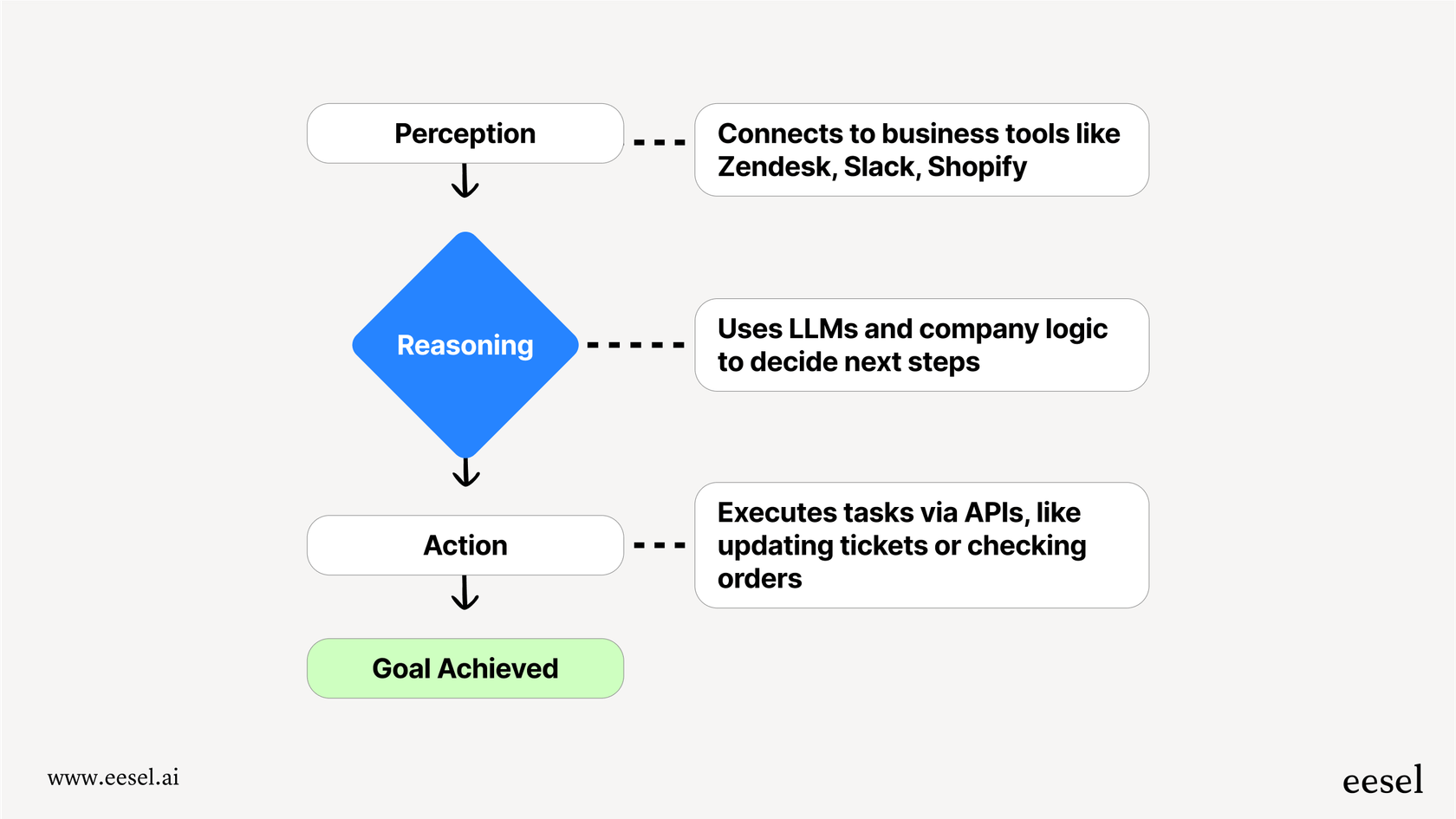
The most useful agents today don't ask you to ditch your current software. The best ones, like eesel AI, act as a smart layer that works with the tools you already have, such as Zendesk or Confluence. This way, you get the perks of automation without the headache of switching systems.
Our criteria for selecting the best AI agents
To help you find the right fit, we looked at dozens of platforms based on what really matters for business teams. We focused on how these tools work in the real world, not just their technical specs or marketing claims. Here’s what we paid attention to:
- Business application: Is the tool actually built for business workflows like customer service or IT support, or is it a general framework for developers?
- Integration depth: How well does it connect with the tools you use daily? Does it improve your setup or force you to replace it?
- Ease of implementation: Can someone without a technical background set it up and manage it, or do you need a team of developers on standby?
- Action-oriented capability: Can it actually do things (like triage a ticket or process a refund), or does it just spit out answers?
- Transparent value: Are the use cases clear and is the pricing model easy to understand?
Comparison of the best AI agents in 2025
This table gives you a quick overview of the top AI agents we'll cover, helping you compare them at a glance.
| Tool | Best For | Key Feature | Pricing Model | Integration Approach |
|---|---|---|---|---|
| eesel AI | Integrated CS & ITSM Automation | Layers on top of existing tools | Per Interaction | 100+ one-click integrations |
| Microsoft Copilot Studio | Teams in the Microsoft Ecosystem | Native M365 & Azure integration | Per User (Add-on) | Ecosystem-first |
| IBM Watsonx Assistant | Enterprise & Regulated Industries | Enterprise-grade security & voice | Usage-based | API & pre-built skills |
| CrewAI | Developers & Technical Teams | Open-source multi-agent framework | Free (BYO API key) | Code-based |
| Devin AI | Autonomous Software Development | End-to-end coding project execution | Per User / Custom | Developer tools |
| Glean | Enterprise Knowledge Management | Unified search across all apps | Custom | Search-first |
The 6 best AI agents for businesses in 2025
Now, let's get into the details of each of the top agents.
1. eesel AI: One of the best AI agents for integrated customer service and IT automation
eesel AI stands out because it’s made to be a smart layer that works with your current tools, not replace them. It connects right into your help desk (like Zendesk or Freshdesk) and knowledge bases to automate support and internal tasks without a difficult migration. It learns from your actual business data including past tickets and internal documents to give accurate help that understands how your business works.
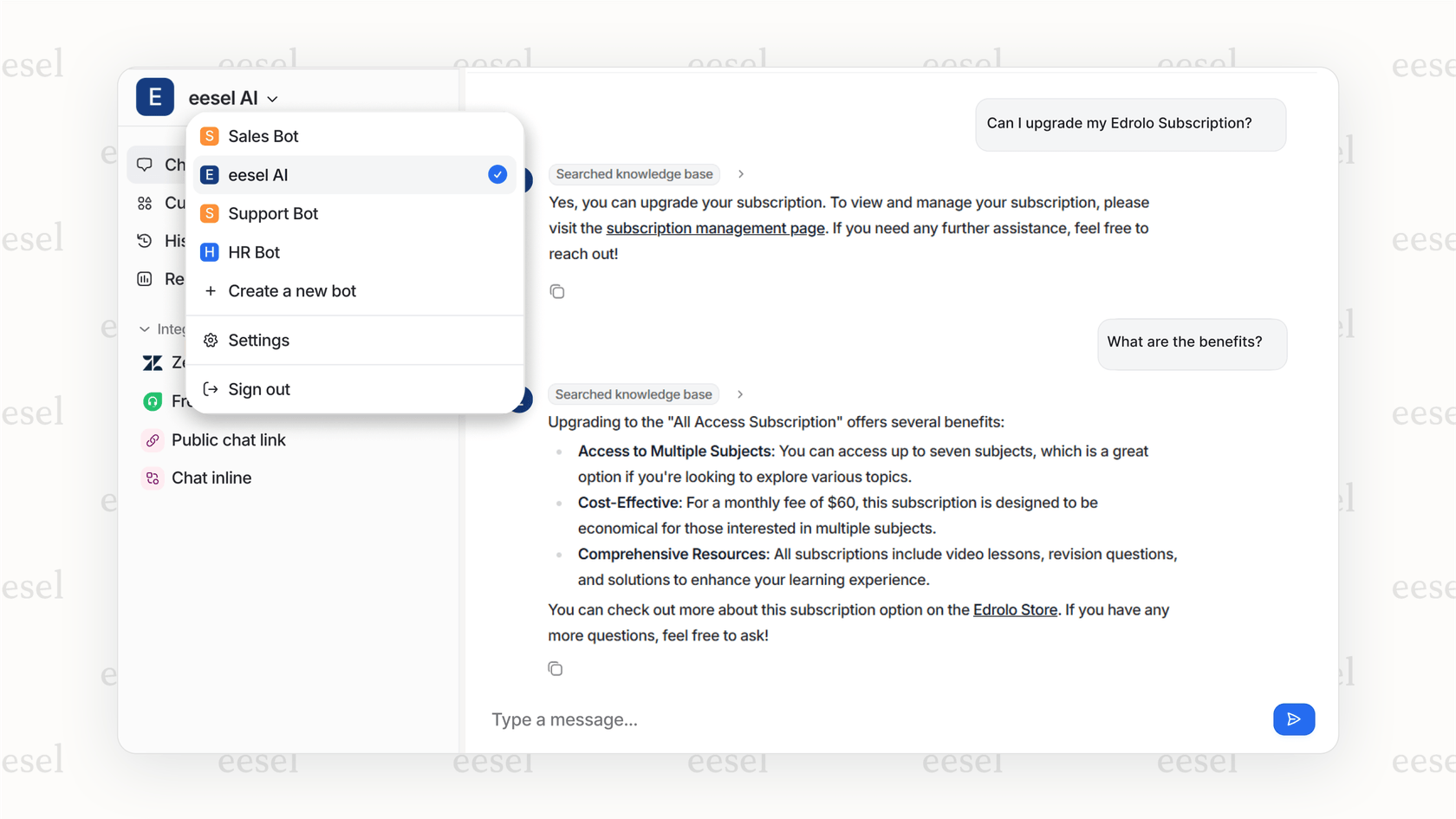
Key features:
- Unified AI platform: It combines an autonomous AI Agent, an agent-assist AI Copilot, and automated AI Triage to manage workflows from start to finish.
- No rip-and-replace: With over 100 integrations, it improves the tools you already have, protecting your team’s processes and investments.
- Action-oriented automation: It does more than just chat. It can check an order status in Shopify, create a Jira ticket, or tag a support request correctly.
- Risk-free rollout: A unique simulation mode lets you test the AI's performance and ROI on your past data before turning it on for live customers, so you know exactly what to expect.
Pricing: Starts at $239/month (billed annually) for the Team plan, which covers up to 3 bots and 1,000 AI interactions per month.
2. Microsoft Copilot Studio: One of the best AI agents for teams embedded in the Microsoft 365 ecosystem
For businesses that live and breathe Microsoft, Microsoft Copilot Studio is a natural choice. It integrates deeply with Teams, Outlook, SharePoint, and the Power Platform, making it great for automating internal tasks. You can build custom assistants that operate right inside the Microsoft suite.
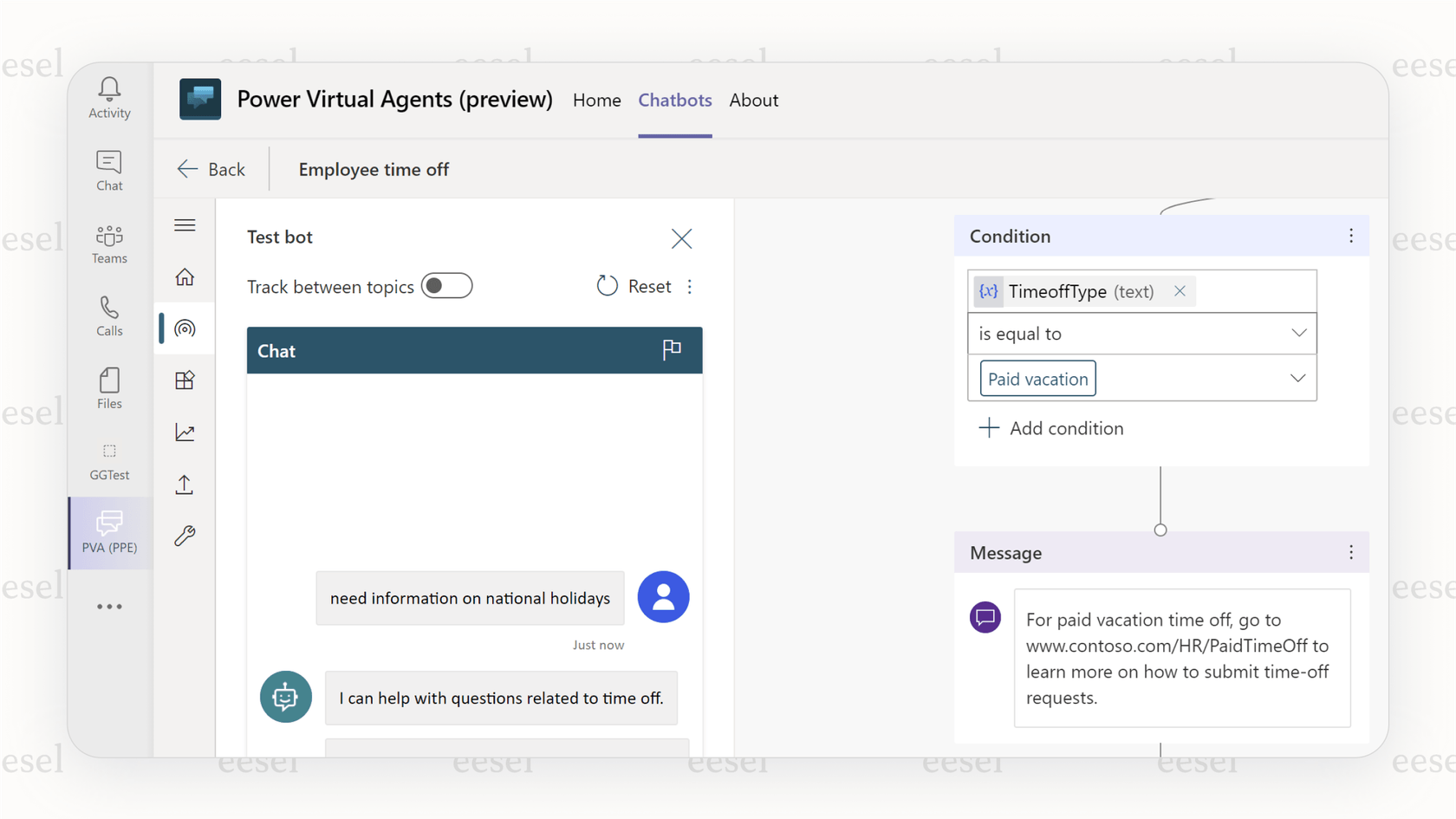
Where it falls short: The biggest plus for Copilot Studio is also its biggest catch. It’s laser-focused on the Microsoft world and doesn't connect easily with outside tools. For teams using a mix of software like Zendesk, Confluence, or Slack, a more neutral solution like eesel AI offers a lot more flexibility. You're not locked into a single vendor's world.
Pricing: Included with Microsoft 365 Copilot add-on subscriptions, which are priced per user.
3. IBM Watsonx Assistant: One of the best AI agents for enterprise-grade security and voice automation
IBM Watsonx has a strong reputation in the enterprise world, especially in regulated fields like finance and healthcare. It provides solid security, compliance features, and advanced tools for building voice agents that can handle tricky phone-based conversations.
Where it falls short: All that power comes with a lot of complexity. The setup can be a major project, often needing special expertise and a long implementation time. This makes it a tough fit for mid-sized companies or teams that need to get an AI agent working quickly. This is where a tool like eesel AI, which can be set up in minutes, really shines.
Pricing: Starts at $140/month for the Plus plan, with enterprise pricing based on custom contracts.
4. CrewAI: One of the best AI agents for developers building custom multi-agent systems
For technical teams who want full control, CrewAI is a popular open-source framework. It lets developers code their own "crews" of specialized AI agents that work together on complex jobs, like doing market research and writing detailed reports.

Where it falls short: CrewAI is built for developers, not business users. It requires you to be comfortable with Python and be ready for a real investment in development and upkeep. For leaders in support, IT, or operations who need a tool they can set up themselves, a no-code platform like eesel AI is a much more straightforward option. You can get going today, not next quarter.
Pricing: Free and open-source, but you’re on the hook for all development and LLM API costs.
5. Devin AI: One of the best AI agents for autonomous software development
Devin AI made a splash as the "first AI software engineer." It's a very specialized agent built to handle coding projects from start to finish, from writing and debugging code to deploying apps. Its abilities are impressive and show the potential of highly focused AI agents.
Where it falls short: Devin's specialty is also its weakness for general business use. It's a great tool for software engineering, but it doesn't help with common business needs like customer support, ticket routing, or internal questions. These are critical areas where platforms like eesel AI are specifically designed to perform well.
Pricing: Plans range from a $20/month Core plan to custom enterprise pricing.
6. Glean: One of the best AI agents for enterprise knowledge management
Glean is a powerful, AI-driven search tool that connects the knowledge across all of a company's apps. It's excellent at helping employees find information fast and can be used to build custom agents that tap into this deep knowledge base.
Where it falls short: Glean is a search platform first and an agent platform second. While it can give agents information, its main strength is finding things, not doing things. Platforms like eesel AI are built for automation from the get-go, with a stronger focus on taking action in tools like help desks and chat platforms to solve problems.
Pricing: Available upon request, suggesting a focus on large enterprise deals.
How to choose from the best AI agents for your business
Picking the right AI agent comes down to matching the tech to what you actually need. Here are four steps to guide you without getting tangled up in technical jargon.
- Start with your current tech stack The first question is simple: do you want a tool that works with your current systems or one that replaces them? If you like your help desk and other tools, look for platforms like eesel AI that are built to integrate, not migrate. It’s the path of least resistance.
- Assess your technical resources Be realistic about what your team can handle. If you don't have developers ready to jump on a new project, it’s best to avoid code-heavy frameworks like CrewAI. Instead, focus on no-code solutions designed for business users. The best tools empower your team, not create more work for engineers.
- Define a clear, high-value use case Don't try to automate everything at once. Find a specific, nagging problem like routing IT tickets or answering common questions about order status and pick an agent that’s good at that one thing. A focused win builds momentum.
- Test before you commit Never buy an AI platform without seeing it work. The best providers offer a free trial or, even better, a simulation mode where you can test the AI on your real data without any risk.
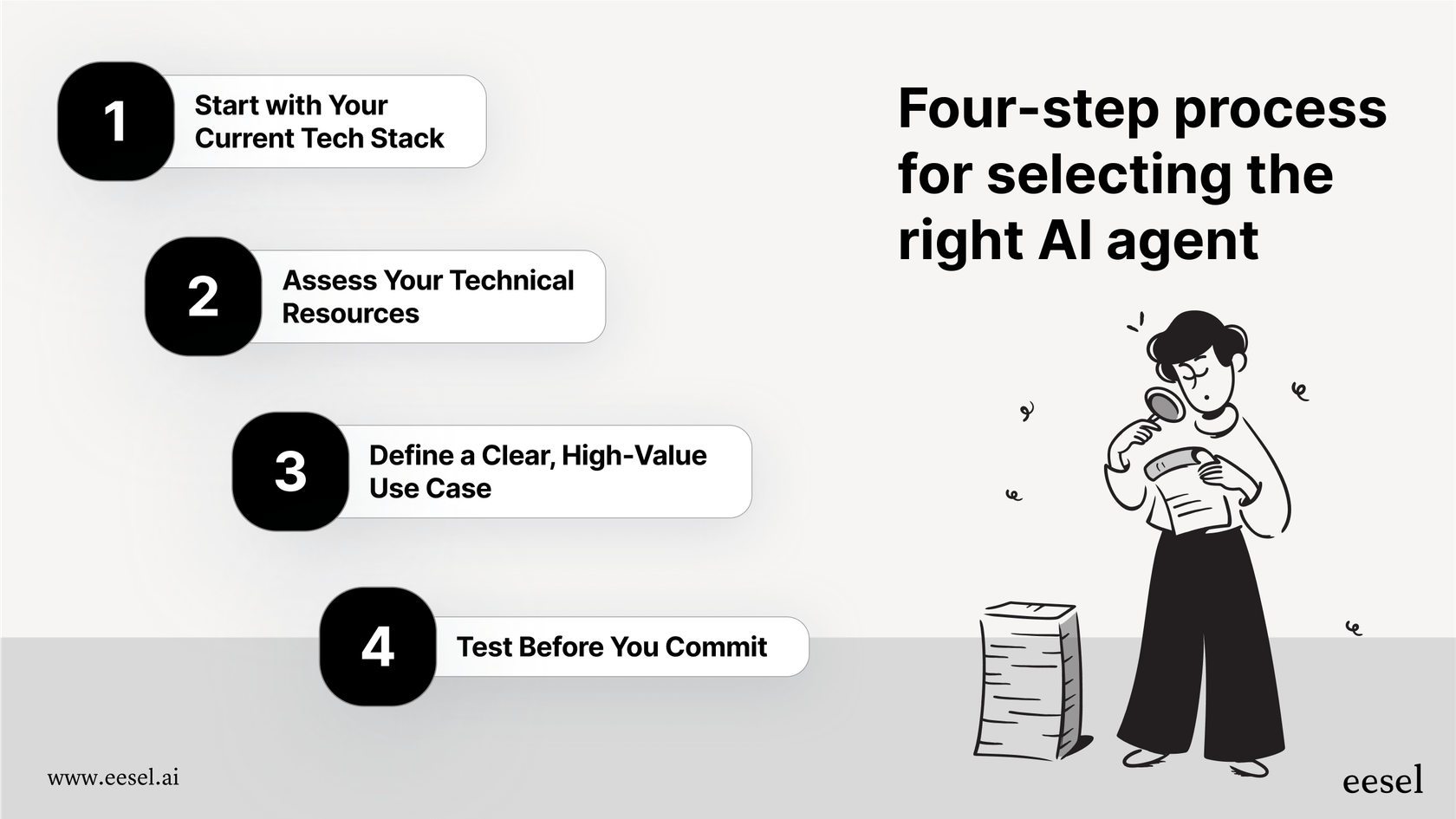
Pro Tip: Use a platform's simulation feature to run the AI on your historical data. It’s a risk-free way to measure potential accuracy and cost savings before you go live. This is a standout feature of eesel AI.
Get started with one of the best AI agents that works for you
Practical AI is finally here. The best AI agents are no longer just an idea; they are tools that can fit into your workflows, automate manual work, and free up your team to focus on what matters. The trick is to find a solution that works with your existing setup rather than forcing a big, expensive change.
If you're looking for an AI agent that improves your current customer service or IT operations without the migration headache, eesel AI is built for just that. It intelligently layers on top of the tools you already use, learns from your unique business data, and can be set up in minutes, not months.
See how easily you can automate your workflows. Start your free trial or Book a demo today.
Frequently asked questions
You should focus on no-code platforms designed for business users. Tools like eesel AI are built so that support or IT managers can set them up in minutes without needing a developer, letting you automate workflows directly.
Top-tier agents don't force you to switch systems; they act as a smart layer on top of your existing tools. They use one-click integrations to connect to your help desk and other apps, allowing them to automate tasks within the software your team already knows.
Start by clearly defining the single, high-value task you want to automate first. Then, look for a platform that not only specializes in that area but also offers a free trial or simulation mode to test its performance on your data before you commit.
Unlike chatbots, they are action-oriented. The best AI agents can triage and tag tickets, update customer records in your CRM, check order statuses in Shopify, or even process simple refunds, freeing up your human agents for more complex issues.
Pricing varies from per-user models, which can be expensive for large teams, to usage-based models that charge per interaction. An interaction-based model, like the one used by eesel AI, often provides better value because it scales directly with your automation needs.
Share this post

Article by
Stevia Putri
Stevia Putri is a marketing generalist at eesel AI, where she helps turn powerful AI tools into stories that resonate. She’s driven by curiosity, clarity, and the human side of technology.




